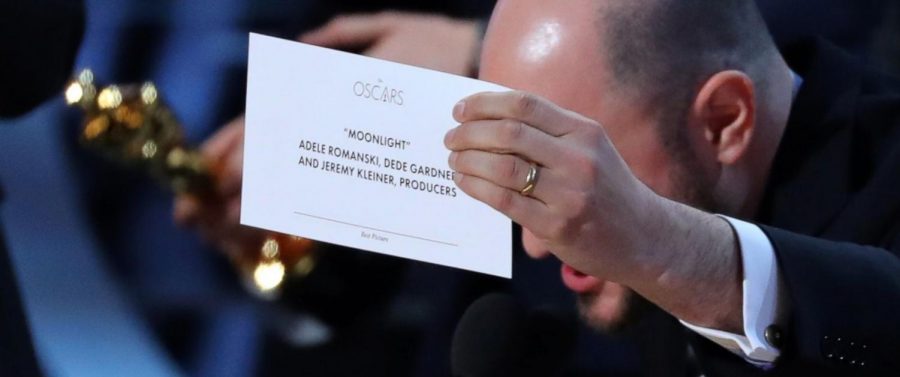Staff Recs: Who Should Win Best Picture
This week’s staff recommendations is on what film should win Best Picture for the 2018 Oscars.
March 2, 2018
With the ever-shifting membership and diversity of the Academy of Motion Picture Arts and Sciences, predicting this year’s best picture has made for an exciting and unprecedented race. Of course, there are precursors to the Academy Awards, like the Golden Globe Awards or Screen Actors Guild Awards, that are substantial indicators of potential winners, but nothing is guaranteed, as proven by last year’s underdog “Moonlight.”
At WSN, we’ve been yelling that 2017 was a groundbreaking year in film, where stories so often unseen — like a girl’s coming-of-age, a queer summer romance, a genre-defying sociological thriller, a mute woman and her fish — traveled to the forefront of cinema. No matter which film takes home the best picture prize on Sunday, the real prize is the hope restored in humanity by film after a desolate year of social and political unrest.
“Call Me By Your Name”
Alejandro Villa Vásquez, Copy Chief
Based on the novel of the same name by former NYU professor André Aciman, “Call Me by Your Name” weaves a wondrous coming-of-age tale of the nymph-like Elio (Timotheé Chalamet) with his furtive summer romance with doctorate student Oliver (Armie Hammer). What makes this movie outshine the other contenders – yes, even “Lady Bird” – is its portrayal of the Florentine countryside and how effortlessly it hosts this darling love affair. The subtle lovemaking and unconventional depictions of sexuality help to normalize portrayals of gay romance in the mainstream. Indeed, the gratification one feels after watching this film has deeper social implications than just beauty and sex.
“Lady Bird”
Ryan Mikel, Arts Editor
“Lady Bird” pushed the boundaries of filmmaking in 2017 by transcending genre and cultivating conversation around women in film today. The Northern California coming-of-age story is the passion project of its real-life Lady Bird, writer and director Greta Gerwig. She fashions an all-too-familiar genre with a breath of intelligent writing, including intricate relationships between a girl, her hometown and her mom. As someone who felt I grew up in a place of cultural significance, I — and so many others — identify with Lady Bird’s unwavering dream of living in New York City and with the film’s brief windows into senior year, first kisses, first heartbreaks and the first time leaving home. John Brion’s woodwind score and Gerwig’s early 2000s playlist are so eloquently woven into the script, and according to interviews with leading ladies Laurie Metcalf and Saoirse Ronan, all motives and emotions of the characters were inked on the pages as well. If anything, it is evident Gerwig’s screenplay is deserving of a best screenplay win this upcoming Sunday. As far as best director and best picture are concerned, I will be stanning “Lady Bird” until the bitter end, even though this honor may go to a woman and a fish.
“Phantom Thread”
Jordan Reynolds, Editor-at-Large
It was incredibly difficult for me to decide which of the nine nominees deserve the title of best picture because two of those films mean so much to me – “Lady Bird” and “Call Me by Your Name.” Both are masterpieces in their own right, as well as devastatingly personal, but as I chose my picks for each category, I felt that both films deserved recognition in other categories. Greta Gerwig for her tour de force directorial debut and Laurie Metcalf’s beautiful, moving performance; James Ivory for his adapted screenplay and Timothée Chalamet for best actor, if not solely for the last five minutes of the film. When it came to best picture, I hesitated to place either of these two into the slot, and ultimately decided that “Phantom Thread” would be my choice if I were a member of the Academy. Do not let the film’s trailer fool you; when I saw it, I immediately presumed that the film would put me to sleep, but I was sorely mistaken. The characters in “Phantom Thread” are complex, the Jonny Greenwood score is absolutely breathtaking, Vicky Krieps is remarkable and thrilling as Alma and the costume design by Mark Bridges (Tisch ‘87) is to die for. What makes director Paul Thomas Anderson’s newest creation something truly special is that it throws you for a loop about halfway through and never looks back. I refuse to spoil what that loop is, but you have three days to go before the awards and find out for yourself.
“Three Billboards Outside Ebbing, Missouri”
Matthew Holman, Entertainment Editor
Frances McDormand could spit on me and I’d take it as a token of high honor, which is a
sentiment the Academy might feel Sunday if “Three Billboards” wins best picture. Her portrayal of Mildred Hayes has already become an acid-tongued icon, with her search for answers being one of the most entertaining film experiences in 2017. But it’s the unquenchable anger she emmits that rings such a resonant bell in film, culture or otherwise – she’s had it with the lack of movement. People in this country feel the same way, and it’s this chord-striking that might make “Three Billboards” a successful campaign.
“Get Out”
Sayer Devlin, Managing Editor
The case for “Get Out” winning best picture is simple. No other movie challenged white, liberal America to examine race like “Get Out” did. From a character saying, “I would have voted for Obama a third time” to director Jordan Peele’s tweeting, “‘Get Out’ is a documentary,” “Get Out” presented white racism in a way unfamiliar to most viewers — let alone the Academy. The film deserves to win for the ideas it catapulted into our collective conscience.
Email the Arts Desk at [email protected].




























































































































































